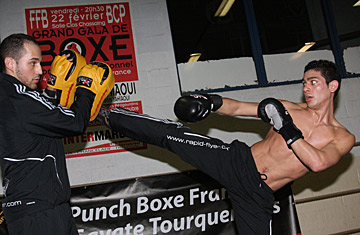
Sharif Hassenzade fights in the youth championship of France.
When 17-year-old Sharif Hassanzade climbed into the ring on Feb. 28 as a finalist in France's junior super-lightweight championship bout, the native Afghan and illegal alien knew a win might be his last hope to avoid deportation when he turns 18 later this year. Now, thanks to a victorious performance in which he beat co-finalist Mehdi Nettour in a unanimous decision by the judges, Hassanzade isn't going anywhere.
Just 48 hours after Hassanzade's triumph in the final, French government officials announced that they would grant the young fighter legal residence papers. Those, in turn, will allow him to apply for naturalization on his 18th birthday so he can represent France on the international stage in the most French of all combat sports: savate, also known as la boxe française. (See pictures of boxing.)
"Only this sport can help me secure my future, allow me to feel freer," Hassanzade told French radio station RTL of the protection that citizenship will provide him. "I want to compete in European and World championships, representing France, and I want to sing La Marseillaise. People who know me already see me as French. They don't think I'm a nothing."
What makes Hassanzade's success so amazing, however, is how it grew from virtually nothing. The son of Afghan shepherds who fled to Pakistan in 2005, Hassanzade was 14 when his parents, determined to give their son a better, more peaceful life, paid smugglers to bring him to France in 2006. Once there, he was abandoned on the streets of Lille by the same people who were supposed to help get him settled in Europe. Despite having little money and knowing no French, the new arrival managed to communicate his dilemma with passersby, and eventually wound up in a children's refuge run by French social services in Tourcoing, near France's border with Belgium.
In addition to the French language lessons and other instruction he was given, Hassanzade was initiated into French boxing by a local social worker and savate coach, Bruno Cardoso. As well as taking the young Afghan under his wing — keeping tabs on his education and helping him with his request to obtain legal residency — Cardoso also shaped Hassanzade's raw athletic talent into the skilled boxing abilities that fueled his rapid rise.
Hard work helped, too. Hassanzade began a training regime that he still follows today: two-hour sessions six nights a week with Cardoso, supplemented by nearly ten additional hours per week of running and jumping rope on his own. The neophyte to savate — which permits blows with the feet as well as the hands — became one of its fastest-rising competitors. Less than two years after he discovered the sport, Hassanzade launched his run for the national junior crown last November, bagging his first of seven straight victories in just two rounds. (See pictures of future sporting stars.)
"He'll still need to keep up the hard work, but it's clear his rapid ascent shows he's got exceptional talent and drive," says Jean-Paul Coutelier, president of France's French Boxing Federation. "Ours is one of the few sports whose roots are traced to its creation here in 1850, and whose identity is firmly attached to wider French culture. That this young, illegal Afghan may now represent France internationally thanks to the citizenship his practice of this sport will help him obtain is really phenomenal."
It's also a contrast to the increasingly negative attitude French society has demonstrated towards immigration since conservative President Nicolas Sarkozy came to power on a pledge to battle illegal arrivals. As part of that effort, Sarkozy formed his current government with an unprecedented Ministry of Immigration and National Identity — a name opponents decry as suggesting the latter represents a threat to the former.
Earlier this year, the former head of that ministry, current Social Affairs Minister Brice Hortefeux, described his "pride" in revealing France had expelled 30,000 illegal immigrants in 2008 — a rise of nearly 29% over the previous year, surpassing the quota of 26,000 Sarkozy had set for him. Ironically, it was Hortefeux's successor, Eric Besson, who on March 2 announced that Hassanzade would be granted resident papers and could apply for naturalization. "It's significant that Sharif's victory provoked a reaction from the Minister of Immigration, not from the Minister of Sports," says Jean-Joseph Tusa, Tourcoing's Deputy Mayor for Sport.
Indeed, Tusa says, he, Cardoso, and countless residents of Tourcoing embraced Hassanzade as one of their own in part because they were horrified at how many of his fellow Afghans have been left stranded as illegals in nearby Calais since a refugee center there was closed on Sarkozy's orders in 2002. Tusa also says that the decades of economic hardship Tourcoing and other northern cities have suffered since the region's textile and coal mining industries collapsed have made residents more compassionate towards Hassanzade and those like him.
But it's taken sporting glory to get the rest of France to pay attention. "We're thrilled that this young man who has worked so hard to integrate and succeed no longer risks the expulsion he and all illegals face once they turn18," Tusa says. "But the truth is, many illegals are also fighters trying to get through each day. And no one stands to applaud them."
